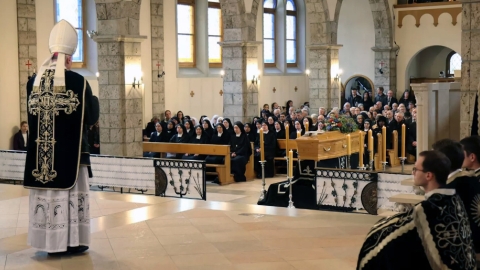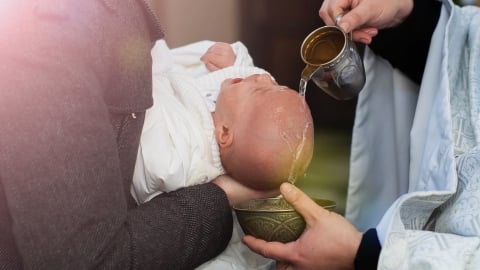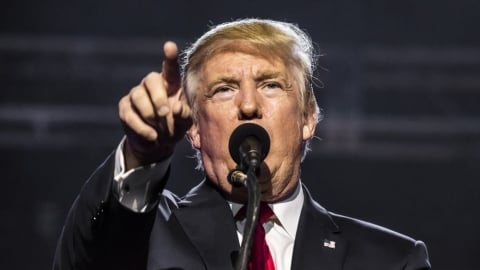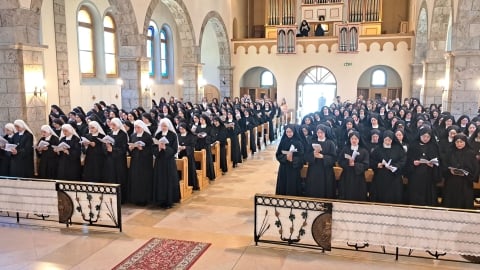A Reminder Concerning the Relationship Between Church and State
The traditional ecclesiastical doctrine on the relationship between Church and State has been developed and tested over the centuries, sometimes in extremely difficult situations. It is useful today to avoid exaggerated or unsound judgements.
This doctrine is based on man’s ultimate objective and the means he must use to achieve it.
A Hierarchy of the Means and the Ends
A distinction must be made in order to understand the basis of the relationship between the State and the Church. The acts which man performs lead him to an ultimate objective, which he knows and understands, and towards which he is heading. But these acts also have a goal of their own. For example, a father works to feed his family, and he practices a profession that has a natural end: engineer, doctor, fireman, taxi-driver, etc. In other words, a distinction must be made between the goal of an action and the ultimate end of the person who carries it out – in Latin we say finis operis and finis operantis, the end of the work and the end of the worker.
Man’s end is supernatural…
If we only consider the final end of the worker, it must be stated that his final end is unique: it is God the Blessed Trinity, seen face to face in the beatific vision, for he who has received the revelation and conforms to it – and this should be the end of every person. Moreover, man should seek God with all his heart, with all his soul, with all his strength and with all his mind. This is why the desired goal must be attained, in a direct manner, by each and every human act.
…but man has two lives
The acts performed by man are of two kinds: those which have as their principle the purely natural life, and those which result from the supernatural life. These two kinds of tasks have two different ends: the accomplishment of the natural life for the one, and the supernatural life for the other. Eating is part of the natural life, even if a Christian must eat for God: “Therefore, whether you eat or drink, or whatsoever else you do, do all to the glory of God”. (I Cor. 10:31) However, receiving Holy Communion is for the supernatural life, even if the natural life is engaged by the material aspect of this act.
However, there is a relationship of dependence between these two lives and these two types of acts: this relationship is indirect, as far as temporal things and temporal acts must be subject to supernatural acts. They must not only not oppose them, but even favour them by removing obstacles to the development of the spiritual life, and by providing it with everything morally necessary for its fulfilment.
This indirect submission also concerns the State
Let us remember that Catholic doctrine recognises that the Church and the State are perfect societies, in their order. In other words, these societies possess the means to attain the end that God has assigned to them. This is not the case with imperfect societies, such as the family, which cannot bring its members to full human fulfilment without the help of the State and the Church.
Furthermore, the powers must order themselves as the ends require, according to the plan of Divine Providence. Thus, temporal power must align itself with the spiritual power, not with regard to its temporal end, which is within its competence, but with regard to the spiritual end, in order to provide the Church with the help She needs for her own end.
It is perhaps useful to recall in passing that the Church has not received from Jesus Christ any power over temporal or political aspects of society. And that She has never claimed direct jurisdiction over the State. Rather, She received from her founder full authority over the baptised, to lead them to eternal life. That is why, in a Christian society, the Church can claim this indirect subordination of the temporal city.
The Obligations of the State Towards the Church
From this indirect subordination – which has, in the history of the Church, been presented as “two swords” – arise a number of obligations of the State towards God and the Church.
The State has the duty to profess the Catholic religion. This obligation was completely obscured or denied by the Second Vatican Council and the post-conciliar documents. This is why His Grace, Archbishop Lefebvre was able to write a book with the title: “They have uncrowned Him”. Who was uncrowned? Our Lord Jesus Christ, by the States refusing or forgetting this duty towards Him, He who is the Creator and the Saviour of the world.
The State also has the duty to protect and defend the Church, in particular by prohibiting false religions, according to the laws of prudence, which may require tolerance towards them in order to avoid greater harm. Thus, it may be necessary to tolerate the practice of a false religion in order to prevent any serious civil unrest and civil war. This doctrine was completely overturned by the new teachings on religious liberty at the Second Vatican Council.
Finally, the State must stand up against moral errors and all those who propagate them, to protect the Christian people from corruption.
In practice, these Catholic truths are forgotten today, if not simply rejected.
Mixed Matters
There is another important point which remains to be clarified, and which is essential to highlight in the current situation. It is what theologians and canonists refer to as “mixed matters”.
The mixed domain concerns matters which, in themselves, touch on the spiritual order, such as matters concerning worship, religious education, marriage and the religious state, but which are at the same time subject to civil legislation. Therefore, by their nature they are of interest to both the Church and the State.
In this mixed domain, it is in the name of its direct power over the spiritual that the Church acts and legislated. 1 However, at the same time, the Church recognises the right of the State to legislate in these matters as well, and, as long as it is not a matter of faith or morals, She is ready to adapt to situations in which the prudence of both parties is involved. For his part, the prince – i.e. the one who directs the State – does not have the same obligation of obedience as in other matters, according to his sound judgement.
To substantiate these assertions, let us look at two examples from the life of Saint Louis, King of France, a king respectful of the Church, if ever there was one. This holy king did not hesitate to oppose the French bishops, and even the Pope, in mixed matters. He refused to intervene with his royal authority against lay people in conflict with bishops on temporal matters. He prudently judged that the bishops, in these cases, were not in the right, and that he did not have to take coercive measures that would not have been just.
When requested by Pope Gregory IX, and again by Pope Innocent IV, he refused to start a war with the Emperor Frederick II of Hohenstaufen, who had been first excommunicated and then deposed. However, he did protect the Pope at the Council of Lyon and put himself at his disposal to seek a compromise with the German Emperor. Only as a last resort did he finally threaten the Emperor with military intervention.
Finally, we should also add that the Church has sometimes had to suffer from abuses of temporal powers, in these mixed matters. For as long as these abuses were not opposed to her mission to save souls, she tolerated them, according to the prudential judgement of her superiors.
[1] See (in french) Lucien Choupin, Valeur des décisions doctrinales et disciplinaires du Saint-Siège, in particular pages 221-222, concerning The Syllabus, Proposition N° 24.
- 1See (in french) Lucien CHOUPIN, Valeur des décisions doctrinales et disciplinaires du Saint-Siège, in particular pages 221-222, concerning The Syllabus, Proposition N° 24.
Application to Current Times
The regulation of public engagements, in this time of epidemic, is clearly a matter of temporal power. It so happens, that Catholic worship involves public gatherings. The question is therefore whether temporal power is within its right in making decisions with regard to Catholic worship, considered in its social dimension from the point of view of public meetings.
To ask the question is, in fact, to answer it, because it is clearly a mixed matter. To deny this right would be simply to obscure this chapter of Catholic doctrine. This situation is not new, moreover, and books on Church history provide many examples of it.
It is no secret that prudence plays a large part here: prudence on the part of political leaders, prudence on the part of the Catholic hierarchy. There can be no question of leaving these decisions to individuals alone, since they concern societies: the State and the Church, or their subdivisions (provinces, dioceses or religious societies). Moreover, individual citizens, or the faithful, can help their superiors in the decisions to be taken, by informing them of the special circumstances which may justify a particular solution. But this does not authorise them to supersede the superior concerning the decisions to be taken, nor to refuse to submit to them.
It is not a question of denying a doctor or a priest the possibility of fulfilling his duty with a spirit of devotion or sacrifice, but both must act in an ordered manner, otherwise they will fall into disobedience or indiscipline. Thus, a religious who has made a vow to care for the contagious sick, even at the risk of his life, will only act in a virtuous manner, if he submits to his superior.
Current circumstances lead us to take decisions that are a matter of prudence and there will always be room for discussion, as in any prudential decision. It is regrettable, for example, that many bishops have generally been quick to suspend all worship or public ministry, even closing churches, before changing their minds. However, the reasons for these decisions must be carefully weighed.
Priests must obviously remain attentive to the spiritual needs of the faithful, while taking into account the precise circumstances and conditions in each county, and according to the authorisations and prohibitions, which sometimes change from one day to the next. But this cannot justify ignoring or scorning the principles which provide guidance in the present situation.
Two Examples From the Spanish Flu Pandemic
In Switzerland, in 1918, the authorities in Porrentruy – today in the Jura canton, but at that time in the canton of Bern – had decreed that “Divine worship and religious gatherings many only be celebrated in the open air and far from built-up areas. Burials will take place without the public and only the next of kin may assist.” The ecclesiastical authorities complied with the decree issued by the civil authorities.
In the United States, similar measures were taken to stem the deadly epidemic. The response of the Catholic hierarchy, although not uniform across the country, showed a careful balance between the concerns for public health and spiritual needs. For example, Bishop John Regis Canevin of Pittsburgh issued the following statement, on October 17th, 1918:
“The Department of Public Health throughout the country are taking unusual precautions to prevent the further spread of influenza which is already epidemic in a number of places. In some districts of Western Pennsylvania churches and schools are closed and all public meetings are forbidden. It is indeed a great hardship for Catholics to be deprived of the opportunity to assemble for Mass and other divine services in their churches; but when, in the judgment of the civil authorities, whose duty it is to safeguard public health, it becomes necessary to close churches and schools and take other strong precautions against epidemics of virulent disease, the only rule for pastors and people is to co-operate with the civil authorities of their district, obey the laws, and comply with regulations that are enacted for the common good. In the city of Pittsburgh, churches are not to be open for public services; no congregation or group of persons is allowed to assemble in them. Public meetings are prohibited.”
Father Arnaud Sélégny
Related links
(Sources: Billot/The Church and Pandemics: Then and Now – FSSPX.Actualités - 08/04/2020)





